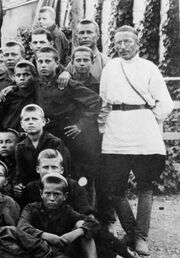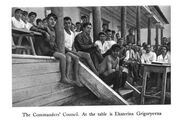Makarenko on education

Makarenko with his kids
The following is based on “The Pedagogical Poem” of Anton Makarenko (1888-1939).
As opposed to Lenin, who believed that #1 priority in Soviet Russia is to restore agriculture and industry on scientific basis, Makarenko believed that #1 priority is to restore, to educate the human being, especially the youth. Human being is #1 factor in today's modern productive forces. Hence, his education acquires utmost importance.
Makarenko stated that the goal of education is "to make a new person in a new way". Here, we should bring a quote of his to explain what he meant: "And what is a clear personal path? It is an alienation from the collective, it is concentrated narrow-mindedness: such a boring care about the future piece of bread, about that lauded professionalism. And what profession? That of a carpenter, a shoe-repair man, a miller. No, I strongly believe that for a boy of 16 years in our Soviet life the most valuable profession is the profession of a person in struggle, the profession of being human". Makarenko meant creating a person who first of all cares not about himself, but about the collective, about humanity in general.
In this emphasis on general human qualities, Makarenko is very similar to another revolutionary - poet Berange, living in the beginning of XIX century. Berange stated that it is not to bring up a scientist, but to raise a citizen, i.e. someone who lives by general concerns, that is the best achievement.
To effect the goal, Makarenko put major emphasis on work. Makarenko did not work with individual children of the rich or well-to-do parents. Milton, for example, designed his educational scheme for the children of the gentry. Rousseau addressed himself to parents financially capable of hiring an individual tutor. Makarenko dealt with homeless youth. Many of them have already taken the road of crime. Makarenko had to build a colony in the conditions of poverty and disaster left in the country after the civil war of 1918-1920.
First, they needed to prepare the building and food for the homeless youth. For example, snow had to be shoveled, and none of the new colonists wanted to do the job. They were taught that only the weak work, while the powerful order around, sit and make fun of others. To overcome this mentality of the street, this mentality of capitalist society, Makarenko had to use force. In fact, he states: "until a collective has been created, as long as there are no people representing the collective, as long as there are no traditions and no elementary work and everyday habits, the educator has the complete right and should not pull back from usage of force".
A very important aspect of this experiment was that tutors and colonists lived together. A kind of equality was established between them, especially in the beginning, when they were all poor. Later, as the country and the colony started to develop, some became better off than others. Living together, sharing the same meals, sharing the same barracks, is important for education. This allows for more and wider interaction between tutors and students than what is available in the classroom.
As the colony developed, they started to produce food for themselves, by engaging in agricultural labor. They were helped by a professional agriculturalist. They were attempting to have a model farm, with application of scientific methods and model organization of labor. The colony was broken up into "regiments", to make it sound like a military game. Each regiment had its work load and its schedule. What is significant about their organization of work is that the leaders of the regiments were involved both in the field work and in the council which managed the colony. Thus, they were practicing self-government, a democracy.

A commanders' council
In parallel with becoming engaged in work, spontaneously they started developing a theater. The theater developed the colonists intellectually, it gave them better speech and language, it both widened their horizons and the horizons of the surrounding villagers, who would come to the performances from many miles around. The theater performances became something like a social necessity, something like Internet of today. In a single winter season the colonists would stage up to 40 different plays! The teenagers were quite innovative in their staging techniques! For example, they would involve Makarenko himself in one of the roles, and they would invent really powerful and dangerous stage effects.
We should notice that in the history of humanity, theatre, as an art form, has reached its peak in societies like England at the time of Shakespeare and Ben Johnson, which is XVI - XVII centuries. At this time the society was undergoing agricultural revolution, which meant application of scientific methods to agriculture. Theater seems to be the best form for developing and spreading ideas at this level of cultural development.
After some time, the colony was transferred to a new location. There they found a wider space, but it was all run down, and there were many young criminals. So, they started with building new and clean toilets. The old ones were particularly despicable. The young criminals whom they inherited with the new place didn't wish to join in the common work efforts. So, there was a general meeting. At the meeting, first there was an agitation campaign for a new attitude to work. Toward one or two special criminals, violence had to be used. Makarenko, this time, relied on the force of his old colonists. Finally, they adopted the principle: those who do not obey the decisions of the common meeting are shown to the doors, to the gates of the colony. And so, a few young people left.
After agricultural work was organized, the colony started to develop its industry. In this it was helped by two factors. First, it was the time of NEP, i.e. the "New Economic Policy", and so the people were buying and selling things, developing small industries, offering services, etc. Second factor which helped them was the friendship which the director of the colony, Makarenko, has made with a powerful Soviet agency, the CheKa, later known as KGB. The people at CheKa were businesslike, not weak intellectuals, whom Makarenko despised for inability to act. They were ready to help in what they understood as socialist construction. So, the colony developed a factory, building first electric drills. They were first orienting themselves at Western prototypes, and later attempted to build something better. Later, in addition to the drills, the factory started producing photo cameras. In the Soviet era this factory was well known for its cameras ("FED").

Makarenko was fired from his position because his educational methods, his love of initiative and self-government, came into collision with the Soviet bureaucracy, gathering its leaden weight in the late 1920's. The colonists, the teenagers were greatly grieved by this loss.
Makarenko makes several methodological observations after the experience. First, he states that it is only from the actual experience that one can deduce certain pedagogical (educational) truths. Otherwise, the subject of education produces indifference so widespread in teachers' colleges. Second observation is that material production of the times is very similar to education of human beings. If we want to understand how to rear and educate young people in our times, we should look for clues at modern production methods. In the times of Makarenko, he looked at the Industrial revolution, specifically at the process of molding and working the steel. I think today we would have to look at how knowledge is produced through interaction with Internet, with other people, learning from books, CD's and DVD's. What in the days of Makarenko was "steel" today would be "information". It is how we process information that should give us clues as to how to educate modern youth.
Оскорбления достоинства педагог стремился избегать, подчеркивая, что даже самый маленький ребенок достоин уважения.
основой работы с трудными детьми по Макаренко были коллектив, труд и дисциплина
существующая в детских домах система воспитания способна растить только иждивенцев и бездельников. И я убежден: только труд, только работа помогает мне создавать из этого, казалось бы, непригодного материала настоящих людей
Во-первых, инициатива зачастую шла не от взрослых, а от самих воспитанников. Еще в колонии им. Горького была организована система отрядов, и все главные решения принимались на совете командиров, без согласия которого даже заведующий колонией не мог предпринять ничего важного. Самостоятельно приняв решение, коллектив был заинтересован в его выполнении
Во-вторых, основой воспитания по-макаренковски являлась дисциплина.
“Допускается: возможно, что личность будет правильно действовать исключительно в силу положительных побуждений. Это абсурд. Как только начинается действие, требуется его порядок и завершение, постоянство, хладнокровие и стойкость”
Коллективизм, дисциплина, уважение к мнению ребенка и индивидуальный подход — по мнению Макаренко, этим правилам нужно следовать не только в работе с трудными детьми
В своей Книге для родителей он призывал пап и мам начинать воспитание детей с воспитания самих себя.
“Вы должны быть не только отцом и шефом ваших детей, вы должны быть еще и организатором вашей собственной жизни, ибо вне вашей деятельности как гражданина, вне вашего самочувствия как личности не может существовать и воспитатель”, — объяснял Макаренко.